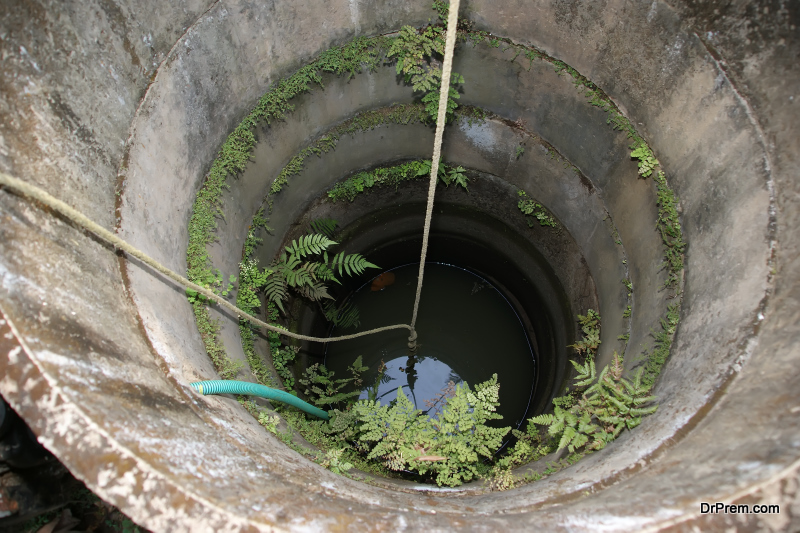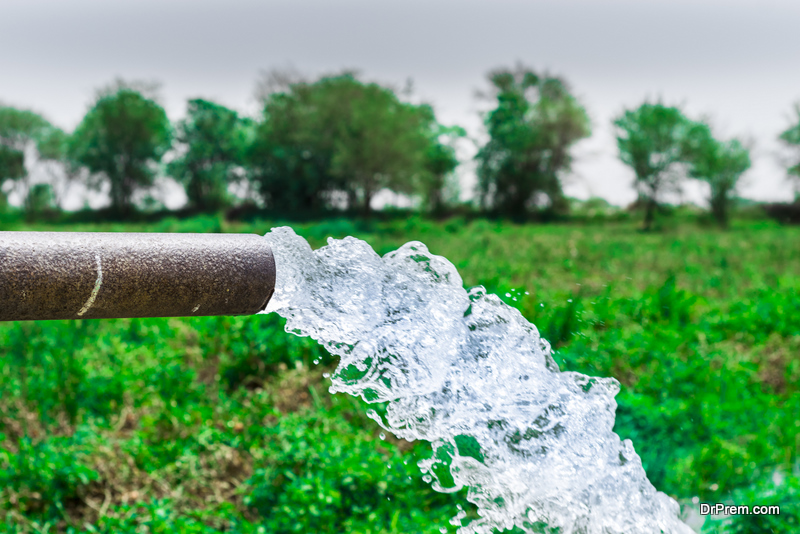To people who live in the cities or suburbs, water wells may seem like a quaint relic of the past. But rural folk and environmentalists know that getting your H2O from a well is not just an inexpensive, environmentally friendly proposition – it also makes for delicious drinking water. Let’s take a closer look at the pros and cons of well water, as well as some precautions to take if you decide to dig a well.
The Advantages of Well Water
 1. It’s inexpensive
1. It’s inexpensive
Water is as close to free as you’re going to get. After the initial outlay of money having the well dug, all you pay for is the electricity that’s necessary to pump it into the home and regular maintenance costs.
2. It’s delicious
Well water has a clean, pure taste that’s unlike anything else. Depending on the treatment facilities used, municipal water can taste unpleasantly metallic or chemical-y.
3. It’s non-toxic
In addition, treatments that use chlorine, fluoride, and other chemicals to decontaminate the water can be dangerous. If you really want to ensure that the water your family uses for drinking, bathing, cleaning and cooking is the best possible quality, choose well water.
4. It’s naturally filtered
Well water goes through a natural filtering process. Not only does this remove a lot of contaminants, but it also makes the water soft. Soft water is gentler on the skin and more pleasant to shower or wash your face with. A lot of people who live in cities and get their water from the municipality have to spend a pretty penny on water softeners to achieve the same effect.
5. It’s healthy
Ever order a mineral water like Perrier? Or, more to the point, ever experienced sticker shock when ordering a mineral water like Perrier? This stuff is essentially the same as well water, just bottled and sold at a premium.
Well water is rich in the minerals that benefit our bodies like:
- Magnesium
- Calcium
- Sodium
- Potassium
- Zinc
- Iron
Imagine being able to access these beneficial minerals just by turning on your tap!
6. It’s reliable
The water you get out of the ground is unlikely to stop flowing, especially if you’ve done your research before digging the well. Compare that to municipal water, which is subject to broken water mains, droughts, boil advisories, and natural disasters – not to mention crumbling infrastructure that leads to contamination from lead and other extremely hazardous issues.
Drawbacks of Well Water
 1. It could be contaminated
1. It could be contaminated
There’s no type of water that isn’t at risk for contamination; that’s just the name of the game. However, well water is generally much safer than its public counterpart. And if proper inspection, testing, and maintenance are performed, then there’s very little to worry about. Homeowners can also opt for a countertop filter to be on the safe side.
Just as with an automobile or HVAC system, it’s important to have your well inspected regularly and to follow maintenance guidelines – lest you run into much bigger problems down the line. Taking care of any small issues as they crop up can help avoid costly, even catastrophic issues later on.
2. It could pose environmental concerns
If your property is located in an area with high industrial or non-organic agricultural activity, be sure to do your due diligence. Otherwise, you well water could contain contaminants such as pesticides, nitrates, arsenic, lead, and other heavy metals or unsafe compounds.
What to Look Out For
Once your well has been planned out, dug, inspected, and tested by the experts, say the folks at https://mountsopris.com/borehole-well-logging-equipment, it’s on you to keep close tabs on the well and the water it gives.
Keep the area around the well clean and free of animal waste, and never dump anything that might be toxic near the well.
Should issues with the water itself arise – think changes in its taste, color, or smell – get a water test immediately. This is especially important if any family members are pregnant, infants, elderly, or otherwise immuno compromised. Be extra vigilant about water quality if the well has had work done on it lately, or if it has gone dry and replenished itself.
Did you enjoy this exploration of well water and its pros and cons? If so, please stick around and read some of our other informative articles!
Article Submitted By Community Writer




